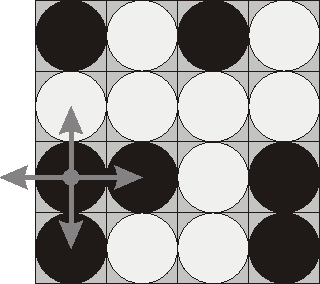Description
Flip game is played on a rectangular 4x4 field with two-sided pieces placed on each of its 16 squares. One side of each piece is white and the other one is black and each piece is lying either it's black or white side up. Each round you flip 3 to 5 pieces, thus changing the color of their upper side from black to white and vice versa. The pieces to be flipped are chosen every round according to the following rules: Consider the following position as an example:
Consider the following position as an example:Input
The input consists of 4 lines with 4 characters "w" or "b" each that denote game field position.Output
Write to the output file a single integer number - the minimum number of rounds needed to achieve the goal of the game from the given position. If the goal is initially achieved, then write 0. If it's impossible to achieve the goal, then write the word "Impossible" (without quotes).Sample Input
bwwb bbwb bwwb bwww
Sample Output
4
Source
Northeastern Europe 2000
ac代碼
#include#include int map[10][10],step,flag=0; int dx[5]={0,0,0,-1,1}; int dy[5]={1,-1,0,0,0}; int jud() { int i,j; for(i=1;i<=4;i++) for(j=1;j<=4;j++) { if(map[i][j]!=map[1][1]) return 0; } return 1; } void fun(int x,int y) { int i,j; for(i=0;i<5;i++) { int fx=x+dx[i]; int fy=y+dy[i]; map[fx][fy]=!map[fx][fy]; } } void dfs(int x,int y,int cnt) { if(cnt==step) { flag=jud(); return; } if(flag) return; if(x==5) return; fun(x,y); if(y<4) dfs(x,y+1,cnt+1); else dfs(x+1,1,cnt+1); fun(x,y); if(y<4) dfs(x,y+1,cnt); else dfs(x+1,1,cnt); } int main() { int i,j; char c; for(i=1;i<=4;i++) { for(j=1;j<=4;j++) { scanf("%c",&c); if(c=='b') map[i][j]=1; } getchar(); } for(step=0;step<=16;step++) { dfs(1,1,0); if(flag) break; } if(flag) printf("%d\n",step); else printf("Impossible\n"); }